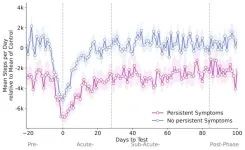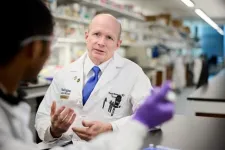(Press-News.org) [Vienna, 19.03.2025]—Between April 2020 and December 2022, over 535,000 people in Germany downloaded and activated the Corona Data Donation App (CDA). Of these, more than 120,000 voluntarily shared daily data from their smartwatches and fitness trackers with researchers, providing insights into vital functions such as resting heart rate and step count.
“These high-resolution data served as the starting point for our study,” explains CSH researcher Katharina Ledebur. “We were able to compare vital signs in 15-minute intervals before, during, and after a SARS-CoV-2 infection.”
Higher Resting Heart Rate And 3,000 Fewer Steps
People with persistent symptoms showed significant differences in activity levels and resting heart rate compared to others. “In the three weeks before infection, patients who later reported persistent symptoms took an average of just 5,075 steps per day—about 3,030 fewer than SARS-CoV-2 patients who recovered without persistent symptoms,” says Ledebur.
Resting heart rates also showed differences before infection. Those who later developed persistent symptoms had a resting heart rate 2.37 beats per minute higher than individuals who recovered without lingering effects. Additionally, they exhibited a more pronounced and prolonged phase of slowed resting heart rate—known as bradycardia—lasting up to 18 days after infection.
“What was surprising was that, for both groups, heart rate and step count eventually returned to pre-infection levels,” Ledebur notes. “Despite ongoing shortness of breath and/or fatigue, affected individuals took as many steps as they did before infection,” says Ledebur.
Two Persistent Symptoms
For the study, researchers divided smartwatch and fitness tracker data into four phases: before infection, during the acute infection (0 to 4 weeks after a positive test), the subacute phase (5 to 12 weeks after a positive test), and the post-acute phase (beyond 12 weeks).
Participants also completed monthly and weekly surveys about Covid-19 tests, their subjective well-being, and ongoing symptoms.
“Using these symptom reports, we found that among 11 symptoms analyzed, only shortness of breath and fatigue persisted beyond the acute phase of SARS-CoV-2 infection. Other symptoms, such as cough, headache, or fever, showed no long-term effects,” Ledebur explains.
Overall, 2.6% of all SARS-CoV-2-positive individuals reported prolonged shortness of breath, 10.4% experienced long-lasting fatigue, and 1.8% had both symptoms.
Raising Awareness And Protecting At-Risk Individuals
The findings of this study suggest that persistent symptoms may be linked to lower fitness levels or preexisting health conditions.
“However, this does not mean that a higher resting heart rate, lower step count, or preexisting conditions alone are responsible for these symptoms,” Ledebur emphasizes. “Rather, they highlight the need for special attention and protective measures for affected individuals,” says Ledebur, who is also a PhD candidate at the Medical University of Vienna.
Exceptional Data Quality
Thanks to the high-resolution smartwatch data from the Corona Data Donation App (CDA), researchers were able to compare not only different patients but also individual changes over time. “If you examine people after they have been infected, you cannot assess individual changes because you lack baseline information,” explains Peter Klimek from CSH and the Medical University of Vienna.
“Despite the advantages of such data, there are limitations: Men are overrepresented, while both adolescents and individuals over 65—who have a higher risk—are underrepresented,” Ledebur notes. Additionally, people who wear smartwatches or fitness trackers may generally be more health-conscious.
“Nevertheless, the study highlights the enormous potential of smartwatches to provide valuable, objective insights into the physiological and behavioral effects of an infection and to help identify individuals at higher risk,” the researchers conclude.
The CDA was launched by the Robert Koch Institute under the leadership of Dirk Brockmann, CSH external faculty member and professor at TU Dresden.
About the study
The study “Wearable Data Reveals Distinct Characteristics of Individuals with Persistent Symptoms after a SARS-CoV-2 Infection” by K. Ledebur, M. Wiedermann, C. Puta, S. Thurner, P. Klimek, and D. Brockmann was published in npj Digital Medicine (doi: 10.1038/s41746-025-01456-x).
About CSH
The Complexity Science Hub (CSH) is Europe’s research center for the study of complex systems. We derive meaning from data from a range of disciplines—economics, medicine, ecology, and the social sciences—as a basis for actionable solutions for a better world. Established in 2015, we have grown to over 70 researchers, driven by the increasing demand to gain a genuine understanding of the networks that underlie society, from healthcare to supply chains. Through our complexity science approaches linking physics, mathematics, and computational modeling with data and network science, we develop the capacity to address today’s and tomorrow’s challenges.
END
Smartwatch data: Study finds early health differences in long COVID patients
People who later experienced persistent shortness of breath or fatigue after a SARS-CoV-2 infection were already taking significantly fewer steps per day and had a higher resting heart rate before contracting the virus, according to a CSH study
2025-03-20
ELSE PRESS RELEASES FROM THIS DATE:
Mere whiff of penguin poo pushes krill to take frantic evasive action
2025-03-20
Imagine looking at the world through the stalked compound eyes of krill in the Southern Ocean. All of a sudden, a penguin appears like a voracious giant, streamlined like a torpedo, chasing and consuming thousands of krill at rapid speed.
Now, researchers have shown that the water-borne smell of the poo of these flightless birds is enough to cause the krill to show escape behaviors.
“Here we show for the first time that a small amount of penguin guano causes a sudden change in the feeding and swimming behaviors of Antarctic krill,” said Dr Nicole ...
Deep in the Mediterranean, in search of quantum gravity
2025-03-20
Quantum gravity is the missing link between general relativity and quantum mechanics, the yet-to-be-discovered key to a unified theory capable of explaining both the infinitely large and the infinitely small. The solution to this puzzle might lie in the humble neutrino, an elementary particle with no electric charge and almost invisible, as it rarely interacts with matter, passing through everything on our planet without consequences.
For this very reason, neutrinos are difficult to detect. However, in rare cases, ...
Parts of the brain that are needed to remember words identified
2025-03-20
The parts of the brain that are needed to remember words, and how these are affected by a common form of epilepsy, have been identified by a team of neurologists and neurosurgeons at UCL.
The new study, published in Brain Communications, found that shrinkage in the front and side of the brain (prefrontal, temporal and cingulate cortices, and the hippocampus) was linked to difficulty remembering words.
The new discovery highlights how the network that is involved in creating and storing word memories is dispersed throughout the brain.
This is particularly crucial for helping to understand conditions such as epilepsy, in which patients may have difficulty with remembering words. ...
Anti-amyloid drug shows signs of preventing Alzheimer’s dementia
2025-03-20
An experimental drug appears to reduce the risk of Alzheimer’s-related dementia in people destined to develop the disease in their 30s, 40s or 50s, according to the results of a study led by the Knight Family Dominantly Inherited Alzheimer Network-Trials Unit (DIAN-TU), which is based at Washington University School of Medicine in St. Louis. The findings suggest – for the first time in a clinical trial – that early treatment to remove amyloid plaques from the brain many years before symptoms arise can delay the onset of Alzheimer’s dementia.
The study is published March 19 in The Lancet Neurology.
The international study ...
Sharing mealtimes with others linked to better wellbeing
2025-03-20
UCL Press Release
Under embargo until Thursday 20th March, 00:01 UK time / Wednesday 19th March, 20:01 Eastern US time
Not peer reviewed | Literature review & data analysis | People
People who share more mealtimes with others are more likely to report higher levels of life satisfaction and wellbeing, finds research led by a UCL academic for the World Happiness Report.
In chapter three of the report, Sharing Meals with Others, the researchers from UCL, University of Oxford, Harvard University and Gallup found that meal sharing as an indicator ...
New DESI results: Evidence mounts for evolving dark energy
2025-03-19
A new analysis of data collected over three years by the Dark Energy Spectroscopic Instrument (DESI) collaboration provides even stronger evidence than the group’s previous datasets that dark energy, long thought to be a “cosmological constant,” might be evolving over time in unexpected ways.
Dr. Mustapha Ishak-Boushaki, professor of physics at The University of Texas at Dallas, is co-chair of the DESI working group that interprets cosmological survey data gathered by the international collaboration, which includes more than 900 researchers ...
New DESI results strengthen hints that dark energy may evolve
2025-03-19
The fate of the universe hinges on the balance between matter and dark energy: the fundamental ingredient that drives its accelerating expansion. New results from the Dark Energy Spectroscopic Instrument (DESI) collaboration use the largest 3D map of our universe ever made to track dark energy’s influence over the past 11 billion years. Researchers see hints that dark energy, widely thought to be a “cosmological constant,” might be evolving over time in unexpected ways.
DESI is an international experiment with more than 900 researchers from over 70 institutions around the world and is managed by the U.S. Department of Energy’s Lawrence Berkeley ...
DESI opens access to the largest 3D map of the universe yet
2025-03-19
The Dark Energy Spectroscopic Instrument (DESI) is mapping millions of celestial objects to better understand dark energy: the mysterious driver of our universe’s accelerating expansion. Today, the DESI collaboration released a new collection of data for anyone in the world to investigate. The dataset is the largest of its kind, with information on 18.7 million objects: roughly 4 million stars, 13.1 million galaxies, and 1.6 million quasars (extremely bright but distant objects powered by supermassive black holes at their cores).
While the experiment’s ...
New study reveals high levels of fusarium mycotoxins in seized cannabis from Arizona and California
2025-03-19
A recent study conducted by researchers from Arizona State University has uncovered alarming levels of Fusarium mycotoxins in illicit cannabis samples seized in Arizona and California.
The study found that 16% of the 118 samples tested positive for harmful mycotoxins, posing potential health risks to consumers. This groundbreaking research highlights the unregulated and dangerous nature of black-market cannabis.
The study, led by Arizona State University professor Maxwell Leung, analyzed cannabis samples obtained between November 2023 and June 2024 from law enforcement seizures. The samples ...
Sleepier during the day? For some older people, it’s linked to twice the dementia risk
2025-03-19
MINNEAPOLIS — For women in their 80s, experiencing increasing sleepiness during the day over a five-year period is associated with double the risk of developing dementia during that time, according to a study published on March 19, 2025, online in Neurology®, the medical journal of the American Academy of Neurology. The study does not prove that daytime sleepiness causes dementia; it only shows an association.
“Sleep is essential for cognitive health, as it allows the brain to rest and rejuvenate, enhancing our ability to think clearly and remember information,” said study author Yue Leng, PhD, of the University of California, San Francisco. “However, ...
LAST 30 PRESS RELEASES:
Kidney cancer study finds belzutifan plus pembrolizumab post-surgery helps patients at high risk for relapse stay cancer-free longer
Alkali cation effects in electrochemical carbon dioxide reduction
Test platforms for charging wireless cars now fit on a bench
$3 million NIH grant funds national study of Medicare Advantage’s benefit expansion into social supports
Amplified Sciences achieves CAP accreditation for cutting-edge diagnostic lab
Fred Hutch announces 12 recipients of the annual Harold M. Weintraub Graduate Student Award
Native forest litter helps rebuild soil life in post-mining landscapes
Mountain soils in arid regions may emit more greenhouse gas as climate shifts, new study finds
Pairing biochar with other soil amendments could unlock stronger gains in soil health
Why do we get a skip in our step when we’re happy? Thank dopamine
UC Irvine scientists uncover cellular mechanism behind muscle repair
Platform to map living brain noninvasively takes next big step
Stress-testing the Cascadia Subduction Zone reveals variability that could impact how earthquakes spread
We may be underestimating the true carbon cost of northern wildfires
Blood test predicts which bladder cancer patients may safely skip surgery
Kennesaw State's Vijay Anand honored as National Academy of Inventors Senior Member
Recovery from whaling reveals the role of age in Humpback reproduction
Can the canny tick help prevent disease like MS and cancer?
Newcomer children show lower rates of emergency department use for non‑urgent conditions, study finds
Cognitive and neuropsychiatric function in former American football players
From trash to climate tech: rubber gloves find new life as carbon capturers materials
A step towards needed treatments for hantaviruses in new molecular map
Boys are more motivated, while girls are more compassionate?
Study identifies opposing roles for IL6 and IL6R in long-term mortality
AI accurately spots medical disorder from privacy-conscious hand images
Transient Pauli blocking for broadband ultrafast optical switching
Political polarization can spur CO2 emissions, stymie climate action
Researchers develop new strategy for improving inverted perovskite solar cells
Yes! The role of YAP and CTGF as potential therapeutic targets for preventing severe liver disease
Pancreatic cancer may begin hiding from the immune system earlier than we thought
[Press-News.org] Smartwatch data: Study finds early health differences in long COVID patientsPeople who later experienced persistent shortness of breath or fatigue after a SARS-CoV-2 infection were already taking significantly fewer steps per day and had a higher resting heart rate before contracting the virus, according to a CSH study







